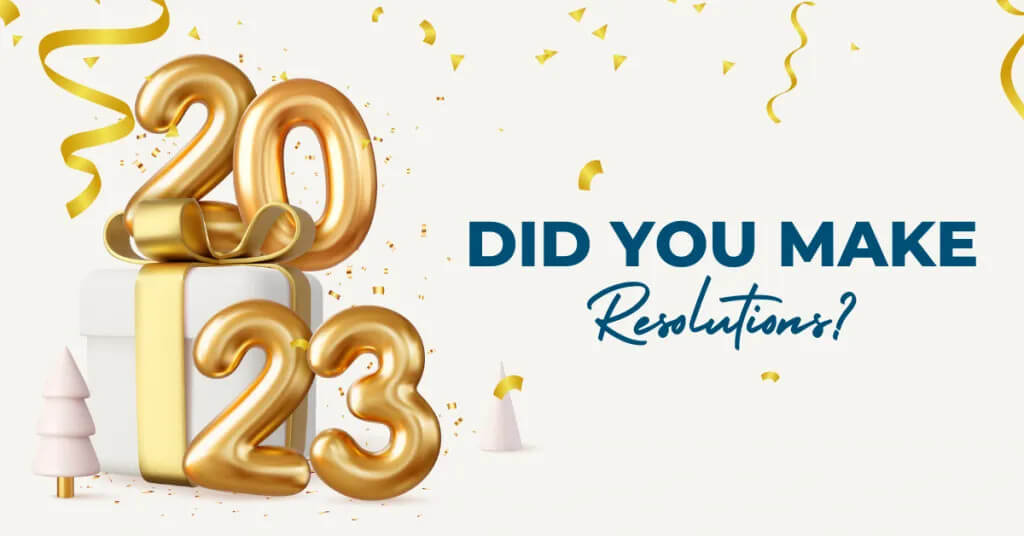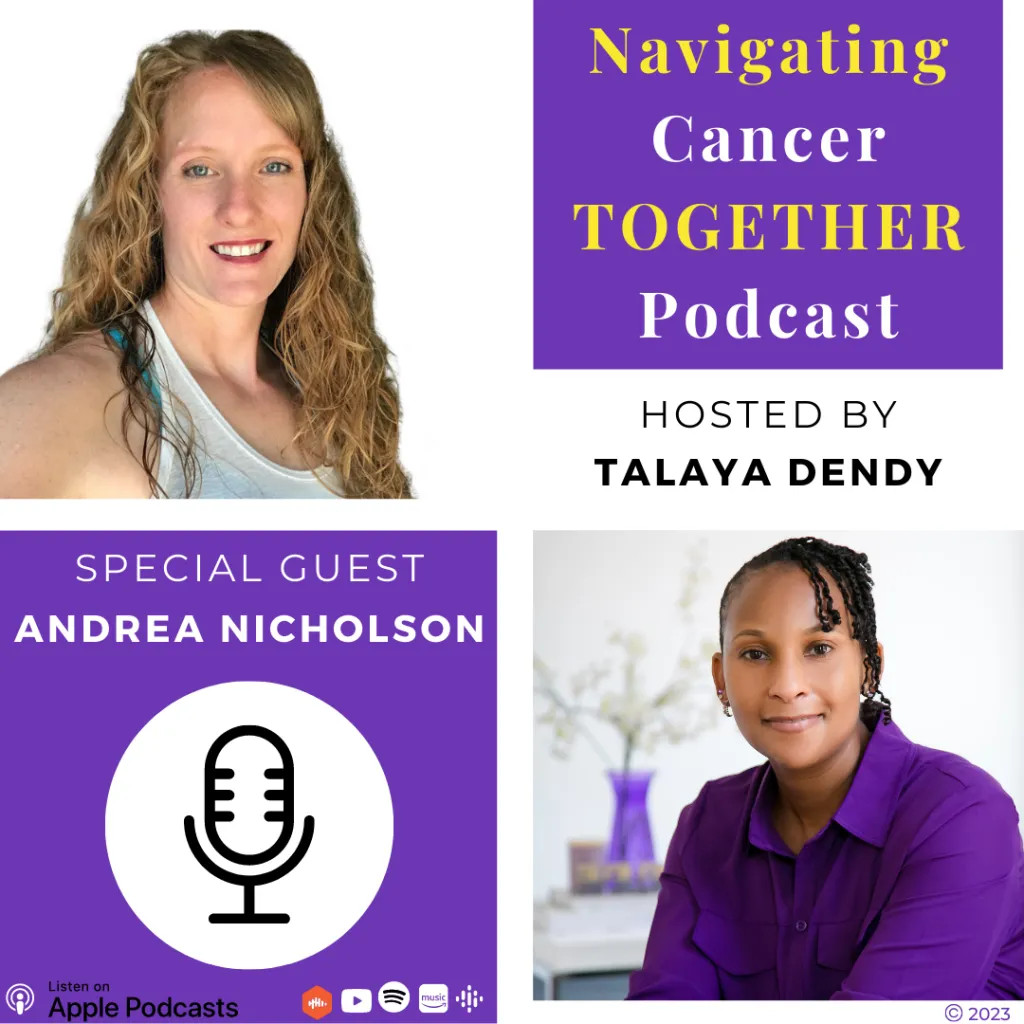
Did you set 2023 New Year’s Resolutions?
Did you know that over 70% of New Year’s Resolutions are related to health? Sadly, only about 9% report feeling successful in their mission. They self-report their reason for failure as setting unrealistic goals, lack of accountability and tracking, they forgot what their resolution was, or they took on too many resolutions.
The most common resolutions are about eating healthier, exercising more, and/or losing weight, although there are many other health-related resolutions that are made.
If we know that resolutions most often fail, why do we continue to make them? Because we still want those results. We still believe we should improve our lives in this way. And because we know there are habits that can be improved on with a little effort.
Why Resolutions Fail
There are a multitude of reasons why setting resolutions don’t necessarily create lasting results.
- Resolutions are often generic – “lose weight”, “eat better”, “exercise more”. With generic goals like these, how do you know if you’re succeeding? What actions will you take to accomplish these goals, even if you made them more specific? And WHY do you want these goals at all?
- We take on far too much all at once in an effort to achieve these goals. How sustainable do you think it would be to go from eating fast food every day to cooking 100% organic food at home – overnight? Highly unlikely! We so badly want these results, that we want them immediately – and when we don’t feel amazing or see changes in our physical shape in the first week or so, we quit because it’s not working anyway.
- We expect miracle products to “fix” everything. Adding expensive supplements or potions to your life without tackling the basics of eating right, is like adding lipstick to a pig. You can’t supplement your way out of a crappy diet. You can’t exercise your way out of a crappy diet. You can’t drink enough shakes to fix poor sleep quality. And no amount of miraculous pink drinks will remedy a high-stress life. Living a truly healthy life takes some effort. It takes a holistic approach to true nutrition, adequate and appropriate exercise, quality sleep, stress management, intentionally adding more joy and happiness in your life, dealing with past traumas and adverse childhood events, reducing toxin exposures where possible, and having the right mindset for lasting change. This sounds hard. It all can be done with ease – and should be done with ease. If you have to force and fight your way through, you’ll quit long before you ever see results. There is a strategic method to improving your overall health, but it’s not through miracle products.
- We prevent discomfort when we actually need to lean into some level of being uncomfortable. Most of us live overly comfortable lives. We have custom temperature-controlled rooms and cars, we sit on cushioned chairs, we warm our foods to the perfect temperature, we add ice to our beverages, we snack when we even think we might be hungry…we micromanage every aspect of our comfort. But growth and change happen in the discomfort. We grow muscles by straining and mildly damaging muscle cells, so they come back stronger. We improve our mental capacity and skill level by trying new things (which generally requires multiple failures before we succeed). Our bodies become resilient by being challenged. We can adapt to colder and warmer temperatures through exposure to colder and hotter environments. We can become more efficient with our body’s fuel usage if we DON’T eat every time we might be hungry. Our immune systems become stronger with every exposure to new environments, new people, new animals, new foods, and new microbes.
- We go it alone far too much. There is a reason pro athletes and Olympians have coaches. It’s not because they don’t know what to do or how to play the game. It’s not because the coach is better at the sport or game than they are. It’s because of the relationship the coach provides as their strive for their goals. Coaches serve as sounding boards in tough times, they advocate for what’s best, and they’re supportive while still saying the hard things. It takes courage and vulnerability to work with a coach. Our society likes to praise independence, yet the most successful people among us have coaches. It’s not just limited to athletes – but many business leaders have speaking coaches, business coaches, mindset coaches, high-performance health coaches, and money mindset coaches. Coaches have the ability to see things in us that we can’t (or don’t want to see) in ourselves. This is how you get results faster and how they last.
So now we’ve discussed why resolutions don’t work…
How do we accomplish our goals?
- Set realistic, specific goals. You’ve likely heard the SMART goal acronym. Specific, measurable, achievable, relevant and time-bound. I fought this method for many years because setting goals this way is hard. But it works. And anything less generally doesn’t. Specific – know exactly what you are looking to accomplish. Measurable – how will you know you’re getting results? Achievable – this keeps you bound by what is realistic. Relevant – how will this make your life better? What will be different when you’ve achieved this goal? And time-bound – when will you have achieved this goal? When throughout the day will you work on it? How often will you take action? How often will you check in on progress? How long will you stick with it before making any tweaks or changes?
- Break down your big goal into much smaller bites. Take on one tiny piece at a time to avoid overwhelm, confusion, and huge expectations. Slowly layer in additional pieces as you feel comfortable and accomplished.
- Do the hard work. Be willing to look at your goal holistically – nutrition, exercise, sleep, stress, mindset, toxins, mental health…every aspect and make necessary changes.
- Get uncomfortable. Push yourself to be ok with discomfort. To feel a little hungry. To be a little sore. To be cold. To be hot. To stand more often. Be safe, but allow discomfort.
- Work with a coach who is aligned with your goals. If you want to lose weight, repair your digestive system, give up sugar, start a workout routine, improve your sleep, and find better stress management techniques – a coach can help you get there faster, more efficiently, and with lasting results. They’ll provide accountability, support, recommendations, and they’ll help you identify those sneaky thoughts that will so quickly derail your progress.
New Year’s Resolutions don’t often work…but I don’t think they’re hopeless. We just have to approach them differently. It’s so much more than simply a statement – “I’m going to lose weight”, “I’m going to eat better”, “I’m going to exercise more”. Instead, they need to be well-thought-out intentional goals with a comprehensive strategy that you can follow with ease, confidence, and clarity.





















0 Comments